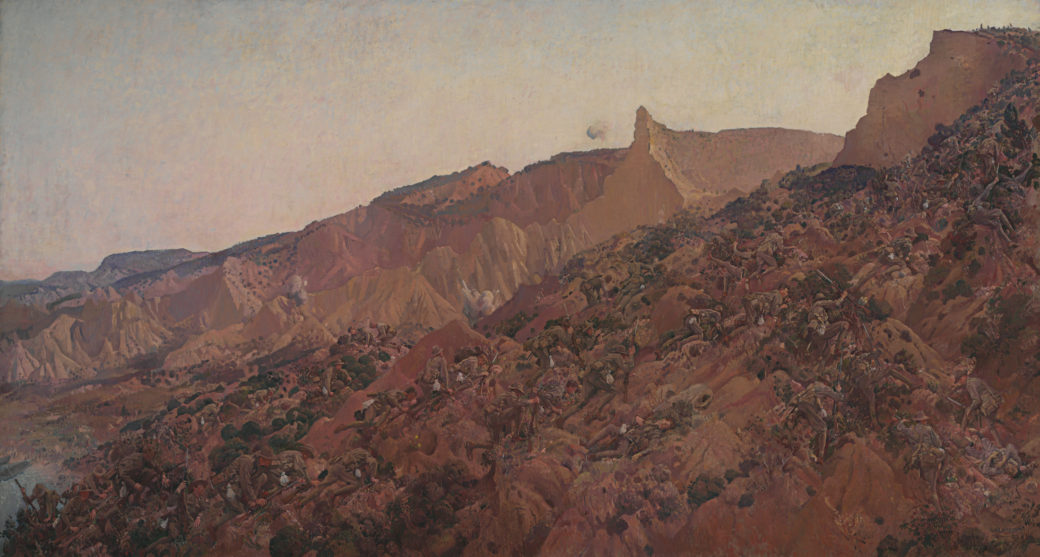On the 25th of April, Australians and New Zealanders pause to remember all their countrymen who died in the world wars. The reason Anzac Day is observed on the 25th of April is because it was the date of the landings at ANZAC Cove during the Gallipoli Campaign. On that day in 1915, around two thousand Anzac’s were killed or wounded during the amphibious invasion of the Gallipoli Peninsula.
As Anzac Day has grown into such an important event for so many people, the landings themselves have often been surrounded in folklore and legend, which is why James Hurst has written The Landing in the Dawn about the events of that day. He has included in his book many accounts from the soldiers who were there that day to try and get a better idea of what actually happened. Some of these accounts are printed below.
To all our readers from Australia and New Zealand, we would like to join you in contemplation to all the heroes who have passed in the wars.
One man named Aitken recalled the success of the soldiers acting without orders.
quite forgot to be frightened. Then … got quite annoyed and reckoned to have my money’s worth if I were
to be shot. So … did my bit with the rest … The boys behaved steadier than many veterans would have …
drove the Turks from seemingly impregnable positions … with the exception of a few isolated examples we
were not led by our officers. The men acted on their own initiative and … saved a very critical situation.
Imagine being fired at by an enemy who were better positioned than you, all while having to climb up a steep hill. Mofflin recalls:
yelling and shouting like mad men … somebody sang out “Wait for the Officers!” “Oh! D____ the Officers,
come on, they can’t hit us.” Wild Australians bluffed Jacko that morning … It was a charge, just a mob
climbing the hills as best we could, pulling and shoving each other up … I was shouting to try and keep my
little section together and about half way up … I prodded Major Brockman in the seat with my bayonet.
The ferocity of the battle was alarming. One eyewitness remembered seeing a soldier named ‘Paddy’ Reid attacking three Ottomans. He clubbed the first over the head with his rifle butt:
[the] second Turk … went for him. Paddy bayoneted him and apparently could not get the bayonet out –
so he dropped it. The third Turk came at him but he brushed his rifle aside and caught hold of the Turk,
threw him onto the ground and kicked him on the head and killed him.
Incidentally, Paddy Reid was meant to be in prison during the raid for assault. His reputation for fighting had saved himself and others on this day though.
For many of the soldiers, this was their first day of combat. One soldier named Mofflin remembered:
Saw 3 Turks firing down onto the beach. There was nobody between them and me, it was a trifle dark for
shooting, but I thought I’d risk it, so I dropped on one knee and let him have it … hit him fair between the
eyes. Killed my first Turk with my first shot. I was that pleased I could have danced on his body.
For the hundreds of injured, the medics were having difficulty caring for everyone. And they were in grave danger too. One man named Eastcott recalls:
[A] terrific blow on the head, an intense white flash and utter darkness. I screamed out “I am hit!” …
convinced … I had been shot through the eyes … the blindness passed off … discovered a gash under
my left eye. The bone seemed … OK and as the shock was wearing off I decided I would probably live a
little longer.
Eastcott wasn’t the only one to think he was about to die after being injured. “One had been shot in the head and seemed hopeless”; the other believed he had been shot through the chest and weakly told Eastcott that “I am done.” Eastcott eventually discovered a spent “bullet sticking in his armpit … I pulled it out … didn’t even … bleed, so I sterilized it … secured the dressing … told him to get up. He said he couldn’t, he was going to die.” Eastcott gave the survivor the bullet as a souvenir, but had a hard time convincing him he would live; eventually he “went off after the others.”


 Follow
Follow